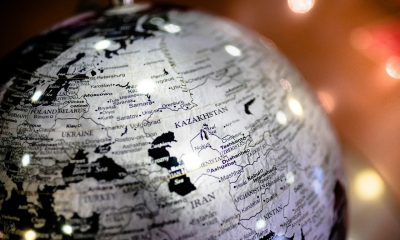FrontPage
Trump konvokasyon # Emir Qatar pou eksplike aksyon destabilizasyon


Last Friday, the White House announced that Qatar’s Emir, Tamim bin Hamad Al Thani, will visit the United States next month. Whilst Doha will undoubtedly talk up the visit, it will likely prove an uncomfortable meeting for the Gulf monarch, with regional sources privately admitting that the Emir can expect a telling off from the US Commander in Chief fed up with the country’s actions following the meeting of Arab leaders in Mecca and continued regional intransigence.
Qatar’s actions are seen by the US administration as contradicting American attempts to reign in an increasingly hostile and aggressive Iran. Following the meeting in Mecca, Qatar made little effort to join other Gulf states in finding a consensus on their approach to Iran. The greatest frustration was with the Qatari decision to not engage in earnest with the meeting itself, instead choosing to air their grievances via the media afterwards. To many it represented their lack of willingness to work in partnership with their neighbours.
Recent attacks on the UAE’s Fujiairah Port and a drone strike on Saudi Aramco pipelines bore have increased regional tensions. At the United Nations last week, Norway, the UAE and Saudi Arabia, the three nations whose ships were affected by the Fujairah incident, prezante evidence strongly suggesting a state actor was behind the incidents, with many seeing Tehran’s destructive hand as responsible.
In the case of the Aramco attack, the link to Iran was clearer, with their Yemeni proxy, the Houthi rebels, gleefully claiming responsibility. Both regional and international actors have expressed widespread concerns about Iranian destabilisation efforts, triggered by their suspected involvement in these latest attacks. Qatar, however, is a notable exception, seemingly little troubled by the destructive impact the Ayatollah and his IRGC aggressors continue to seek.
Doha has gone to great lengths in recent years to cosy up to Iran. This comes despite the clear threat posed to their neighbours, the efforts to foment unrest in otherwise stable nations and its open hostility to the more tolerant, open approach adopted by the other Gulf states. In this respect, Qatar is seen to stand apart from the rest of the GCC in not only failing to oppose Iranian hostility, but in some cases, tacitly encouraging it.
Doha’s documented links to extremists and terrorist organisations, who also enjoy close relationships with Iran, is perhaps the best example of this. In 2015, for example, Qatar fini disbursing more than $1bn in ransom funds to terrorist organisations, with a considerable portion ending up in the hands of known Iranian proxies, such as Kata’ib Hezbollah, which is believed to have orchestrated hundreds of attacks on American soldiers in recent years. Additionally, Al-Jazeera Arabic, the mouthpiece of the Qatari regime, has regularly hosted extremist voices supportive of Iranian belligerence.
It is not surprising that President Trump and America’s patience has worn thin. Whereas Washington has been able to rely on its other Gulf allies for support in pressuring Tehran to back down, it will be angered that Qatar has not supported these efforts. It seems that anger will now be channelled directly at the Emir, in what many will hope sees him reconsider Doha’s continued support for further Middle East unrest.
Pataje atik sa a:
-

 Bangladèch5 jou de sa
Bangladèch5 jou de saMinis Zafè Etranje Bangladèch ap dirije selebrasyon Endepandans ak Jounen Nasyonal nan Brussels ansanm ak sitwayen Bangladèch yo ak zanmi etranje yo.
-

 Konfli2 jou de sa
Konfli2 jou de saKazakhstan etap nan: Pont Ameni-Azerbaydjan divize
-

 Woumani5 jou de sa
Woumani5 jou de saSoti nan òfelina Ceausescu a, nan biwo piblik - yon ansyen òfelen kounye a aspire vin majistra nan komin nan Sid Woumani.
-

 Lwa sou Sèvis Digital yo4 jou de sa
Lwa sou Sèvis Digital yo4 jou de saKomisyon an deplase kont Meta pou vyolasyon posib nan Lwa Sèvis Dijital

























